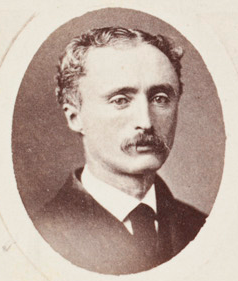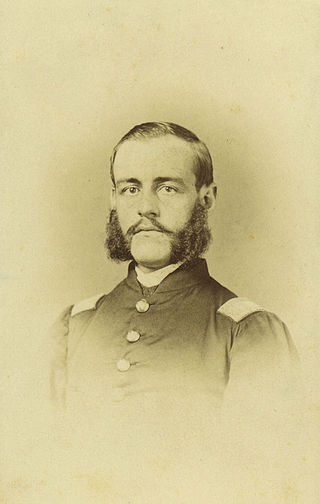
John Charles Black was a Democratic U.S. Congressman from Illinois. He received the Medal of Honor for his actions as a Union Army lieutenant colonel and regimental commander at the Battle of Prairie Grove during the American Civil War.

Aaron Fletcher Stevens was a Union Army officer during the American Civil War and a two-term U.S. Congressman.

Amasa Cobb was an American politician and judge. He was the 6th and 9th Chief Justice of the Nebraska Supreme Court and the 5th Mayor of Lincoln, Nebraska. Earlier in his life, he was a United States Congressman from Wisconsin for 8 years and served as the 13th Speaker of the Wisconsin State Assembly. He also served as a Union Army officer during the American Civil War.

Charles Lane Fitzhugh was a Union Army colonel during the American Civil War, who was later appointed a brevet brigadier general of volunteers for gallantry, energy and ability and a brevet brigadier general in the regular U.S. Army for gallant and meritorious services in the field during the war.

Samuel Miller Quincy was the 28th mayor of New Orleans and a Union Army officer during the American Civil War.

St. Clair Augustine Mulholland was a colonel in the Union Army in the American Civil War who later received the brevets of brigadier general of volunteers and major general of volunteers and the Medal of Honor for gallantry in action at the Battle of Chancellorsville.

Thomas Worcester Hyde was an American Union Army colonel, a state senator from Maine, and the founder of the Bath Iron Works, one of the major shipyards in the United States. He wrote two books about his experiences during the American Civil War and at the Battle of Gettysburg.

William Stowell Tilton was an American businessman and soldier who led a regiment, and occasionally a brigade, in the Army of the Potomac during the American Civil War. He and his men were heavily engaged in the Battle of Gettysburg, where Tilton's performance created controversy.
Reuben D. Mussey Jr. was a Union Army colonel during the American Civil War and a distinguished lawyer. He was an important recruiter of black men into the United States Colored Troops. Between April 1865 and November 1865, Mussey was President Andrew Johnson's private secretary. Johnson nominated Mussey for appointment to the brevet grade of brigadier general of volunteers, but the U.S. Senate did not confirm the appointment. Mussey was the husband of Ellen Spencer Mussey who was also his law partner and became the head of the practice upon his death.

Charles Hamlin, from Bangor, Maine, was an attorney and a Union Army officer during the American Civil War, attaining the rank of major. He was nominated for appointment to the grade of brevet brigadier general of volunteers by President Andrew Johnson on January 13, 1866, to rank from March 13, 1865, and the United States Senate confirmed the appointment on March 12, 1866. He was one of the sons of Vice President Hannibal Hamlin and a brother to Cyrus Hamlin, a Union Army brigadier general.

John Francis Appleton was a lawyer and Union colonel in the American Civil War from the state of Maine who was awarded the honorary grade of brevet brigadier general, United States Volunteers.
George Varney (1834–1911) was a colonel in the Union Army during the American Civil War and was awarded the grade of brevet brigadier general, United States Volunteers, in 1867 for his gallant service at the Battle of Fredericksburg on December 13, 1862. Born in Levant, Maine, he was a wholesale grocer in Bangor, Maine when the war broke out in 1861.
Charles Wentworth Roberts (1828–1898) was a colonel in the Union Army during the American Civil War, who was awarded the rank of brevet brigadier general, United States Volunteers, in 1866, to rank from March 13, 1865. He was born in Old Town, Maine, and graduated from Bowdoin College, but lived most of his life in nearby Bangor, Maine. He was the son of prominent local lumber merchant Amos M. Roberts. His father was the wealthiest man in Bangor according to the 1840 census. Roberts enlisted as lieutenant colonel of the 2nd Maine Volunteer Infantry Regiment in 1861, the first unit to leave Maine in response to President Abraham Lincoln's call for volunteers to suppress the rebellion after the fall of Fort Sumter. With the promotion of the regiment's colonel Charles Davis Jameson, USV, to brigadier general, Roberts became colonel of the regiment. Roberts had a horse shot out from under him at the Second Battle of Bull Run, when he commanded the 1st Brigade while General John H. Martindale suffered from typhoid fever. Roberts retired due to ill health in 1863 and was succeeded on January 10, 1863, by Colonel George Varney. Then Lieutenant Colonel Varney had led the regiment at the Battle of Fredericksburg on December 13, 1863, where he received a head wound from a shell fragment. President Andrew Johnson nominated Colonel Roberts for the award of the grade of brevet brigadier general, United States Volunteers, on February 24, 1866, and the brevet was confirmed by the U. S. Senate on April 10, 1866, to rank from March 13, 1865.
George Perkins Hawkes was a colonel in the Union Army during the American Civil War. He commanded the 21st Regiment Massachusetts Volunteer Infantry from April 1863 to July 1864. In March 1867, he was awarded the honorary grade of brevet brigadier general, United States Volunteers, to rank from March 13, 1865, seven months after his resignation of his commission in the army.

Caspar Crowninshield was a volunteer officer in the Union Army during the American Civil War.
Greely Stevenson Curtis was a volunteer officer in the Union Army during the American Civil War.

John Egbert Farnum was a brevet general in the United States Army during the Mexican–American War and the American Civil War, and captain of the illegal slave ship Wanderer.
John Benjamin Dennis was a Union Army officer during the American Civil War who was subsequently appointed a brevet brigadier general. He was a metal worker before the war. At the beginning of the war, he served as a private with the 6th Massachusetts Militia. He later served as a captain in the 7th Connecticut Volunteer Infantry. He was severely wounded at the Battle of Pocotaligo in South Carolina. He was later captured at Bermuda Hundred, Virginia, on June 2, 1864. After his release, he was appointed major and additional paymaster on January 25, 1865. He subsequently received appointments to the brevet ranks of lieutenant colonel and colonel to rank from March 13, 1865. He was mustered out of the volunteers on July 31, 1865.
Adrian Rowe Root was an American commission merchant, warehouse executive, newspaper editor and military officer in the Union Army during the American Civil War. He served as brigade commander for much of the war but his highest actual substantive grade was colonel. His March 2, 1865 nomination for appointment as brevet brigadier general of volunteers to rank from March 2, 1865, was confirmed by the United States Senate on March 9, 1865. His January 13, 1866 nomination for appointment as a brevet major general of volunteers, to rank from March 13, 1865, was confirmed by the U.S. Senate on March 12, 1866.
Adolph Engelmann was a farmer, lawyer, postmaster, Mexican–American War veteran, and Union Army colonel during the American Civil War. On May 18, 1866, the United States Senate confirmed his appointment as brevet brigadier general of volunteers.











